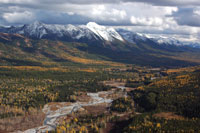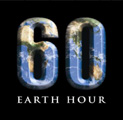
News |
- Sierra Club Files Complaint Over Oilsands Ad
- Insurance Commissioners Adopt Climate Disclosure Policy
- Environmental Performance Index Released
- Green Budget Coalition Advice for 2010
- B.C. Bans Mining, Oil and Gas in Flathead Valley
- Earth Hour 2010
- Peoples Submission - Copenhagen Accord
- Where Is the Hope after Copenhagen?
- Corporate Disclosure for Climate Mandate
- Tembec Requests Twenty Year Licence
- First Bottled Water Free Day
- One Quarter US Grain Goes to Cars, Not People
| Sierra Club Files Complaint Over Oilsands Ad | 17 February 10 |
 The Sierra Club of Canada alleges in its complaint to Advertising Standards Canada that Canwest tried to disguise the fact that Shell Canada paid for articles on the oilsands that ran in several of the chain's major dailies. The Sierra Club of Canada alleges in its complaint to Advertising Standards Canada that Canwest tried to disguise the fact that Shell Canada paid for articles on the oilsands that ran in several of the chain's major dailies.The Canwest series, headlined New Energy Future, was entitled "a special information feature, in partnership with Shell Canada." That phrase is in print three millimetres high. The pieces were published in the National Post, the Montreal Gazette, the Ottawa Citizen, the Edmonton Journal, the Calgary Herald, Toronto Star and the Vancouver Sun. The stories describe Shell's environmental work and profile Shell employees. "Myth Buster" sidebars portray Shell's oilsands operations positively. "They should be marked clearly that they are advertising," Sierra Club director John Bennett said Thursday. "They appear to be newspaper stories." "The normal standards that would apply would be to identify it clearly as advertising rather than as editorial content," says Chris Waddell, director of the Carleton University School of Journalism. "But you can see over the years, both in newspapers and magazines, an attempt being made to make the differences look as insignificant as possible." View February 11, 2010 Winnipeg Free Press articleView August 13, 2008 WWF article View Advertising Standards Canada website View Shell Advisement: Climate change: A reality check View Shell Advisement: Shell innovation unlocks oil sands Source: Winnipeg Free Press |
|
 Print version Print version |
Top |
| Insurance Commissioners Adopt Climate Disclosure Policy | 17 February 10 |
 The US National Association of Insurance Commissioners (NAIC) have adopted a mandatory requirement for insurance companies to disclose financial risks faced from climate change and actions being taken to respond. The US National Association of Insurance Commissioners (NAIC) have adopted a mandatory requirement for insurance companies to disclose financial risks faced from climate change and actions being taken to respond.NAIC states climate change will have impacts on insurance companies including company financial health and availability and affordability of insurance for consumers. Insurance companies with premiums of $500 million or more a year are now required to complete an Insurer Climate Risk Disclosure Survey every year with a first deadline of May 1, 2010. Scope of the new disclosure is broad, covering altering risk management to catastrophe risk modeling and steps taken to educate policymakers and policyholders. Recently, the NAIC Climate Change and Global Warming Task Force released a draft notification letter to insurers with instructions how to respond to the regulators climate risk disclosure survey. An extensive report, Global Risks 2010, outlining climate changed risks has been released by NAIC View March 17, 2009 NAIC press ReleaseView NAIC Climate Change and Global Warming Task Force website View Climate and Insurance website View Global Risk Report 2010 (PDF) Source: National Association of Insurance Commissioners |
|
 Print version Print version |
Top |
| Environmental Performance Index Released | 12 February 10 |
 In evaluating the environmental performance of 163 countries the Environmental Performance Index (EPI) has named Iceland the most environmental nation.
Other European nations, Switzerland (2nd), Sweden (4th) and Norway (5th), also took top places, with Costa Rica (3rd) highest scoring outside Europe. In evaluating the environmental performance of 163 countries the Environmental Performance Index (EPI) has named Iceland the most environmental nation.
Other European nations, Switzerland (2nd), Sweden (4th) and Norway (5th), also took top places, with Costa Rica (3rd) highest scoring outside Europe.The EPI has been created by experts from Yale and Colombia Universities to look at ten environmental categories for each nation including: environmental health, air quality, water resource management, biodiversity and habitat, forestry, fisheries, agriculture, and climate change. The United States scored as 61st on the list, plunging twenty-two places from 2008, largely due to failure to deal with greenhouse gas emissions and air pollution problems. Canada also took a big plunge, falling from 12th place to 46th. Canada has come under increasing criticism for its stagnant climate change policies and its tar sands industry. View 2010 Environmental Performance IndexView January 27, 2010 MongaBay article View February 3, 2010 European Commission Joint Research Centre article Source: MongaBay |
|
 Print version Print version |
Top |
| Green Budget Coalition Advice for 2010 | 12 February 10 |
 Based on Prime Minister Stephen Harper's request for input on the upcoming federal budget, the Green Budget Coalition (GBC) identified three priority budget recommendations for 2010. Adoption of these priorities could create over 8,000 new jobs in renewable energy, ensure clean drinking water sources, and help Canada meet its commitment under the United Nations Convention on Biological Diversity. Based on Prime Minister Stephen Harper's request for input on the upcoming federal budget, the Green Budget Coalition (GBC) identified three priority budget recommendations for 2010. Adoption of these priorities could create over 8,000 new jobs in renewable energy, ensure clean drinking water sources, and help Canada meet its commitment under the United Nations Convention on Biological Diversity."These are prime opportunities for Canada to shine on the world stage during the International Year of Biodiversity and in the lead-up to the G8 and G20 Summits," states Barry Turner, Chair of Green Budget Coalition, and Director of Government Relations, Ducks Unlimited Canada. The Green Budget Coalition 3 priority recommendations for 2010 are:
View February 4, 2010 The Sierra Club article View February 4, 2010 Ducks Unlimited Canada article View February 4, 2010 Environmental Defence article Source: Greenbudget.ca |
|
 Print version Print version |
Top |
| B.C. Bans Mining, Oil and Gas in Flathead Valley | 12 February 10 |
 The British Columbia government announced in February 2010 that it will ban all mining and oil and gas development in the Flathead Valley, located in the southeastern corner of the province. The British Columbia government announced in February 2010 that it will ban all mining and oil and gas development in the Flathead Valley, located in the southeastern corner of the province."Mining, oil and gas development and coalbed gas extraction will not be permitted in British Columbia's Flathead Valley," announced Lieutenant Governor Steven Point by during the Speech from the throne February 10th, 2010. "We applaud the government for doing the right thing for the Flathead River Valley." states John Bergenske, executive director of Wildsight. "The next step is to connect the Flathead through the spine of the Rockies as a provincial wildlife management area so that wildlife values are adequately managed." Conservation groups urge these further steps as critical to the integrity of the Flathead/Crown of the Continent ecosystem. This ecosystem contains British Columbia's most endangered river, the world's first international peace park, and a biological richness that scientists around the world identify as needing protection. In January, a team of UN scientists recommended a moratorium on mining in the valley, noting nearby Glacier National Park in Montana and Waterton International Park in Canada were listed as a World Heritage Site in 1995 because of their outstanding scenery and abundant wildlife. View February 10, 2010 CPAWS articleView February 9, 2010 Wildsight article View February 10, 2010 CBC article View February 10, 2010 Sierra Club BC article Sources: CPAWS, CBC, Government of BC
Photo Source: Sierra Club BC |
|
 Print version Print version |
Top |
| Earth Hour 2010 | 10 February 10 |
 The event that began in one city just three years ago has now grown to be the largest environmental movement in history! In 2009 hundreds of millions of people around the world turned out their lights for one hour to show their support for climate action. The event that began in one city just three years ago has now grown to be the largest environmental movement in history! In 2009 hundreds of millions of people around the world turned out their lights for one hour to show their support for climate action.In 2010 Earth Hour is at 8:30 PM March 27, 2010. Political leaders around the world have not yet negotiated a global deal on climate change. The United Nations Climate Change Summit in Copenhagen last December fell far short of what's needed. Earth Hour 2010 is critical to tell world leaders to finish the job by quickly completing a fair, ambitious and binding deal to avert dangerous climate change. Started in 2007 in Sydney Australia, people in 88 countries and 4100 cities participated in 2009. WWF International sponsored 2008, 2009, and is leading Earth Hour 2010. Last year ten million Canadians turned off the lights. Canada will be in the spotlight this year as Prime Minister Harper hosts the next meeting of the G20 countries in Canada June, 2010, where the climate talks must continue. View WWF Earth Hour information pageView WWF Facebook page View Earth Hour Wikipedia entry View Earth Hour 2010 commercial View January 28, 2010 Green Daily article Source: WWF |
|
 Print version Print version |
Top |
| Peoples Submission - Copenhagen Accord | 10 February 10 |
 A network of leading non-government organizations made a Peoples Submission to the United Nations to represent Canadians who support Canada meeting its Kyoto Protocol emission reduction targets. The Peoples Submission was filed by January 31, 2020, the date by which countries who signed onto the Copenhagen Accord, were to submit their target emissions in keeping with the Accord language. A network of leading non-government organizations made a Peoples Submission to the United Nations to represent Canadians who support Canada meeting its Kyoto Protocol emission reduction targets. The Peoples Submission was filed by January 31, 2020, the date by which countries who signed onto the Copenhagen Accord, were to submit their target emissions in keeping with the Accord language.The Canada Peoples Submission will be considered by the UN with submissions from other countries with their emissions targets for 2020. It suggests Canada should take stronger action by reducing emissions 25% below 1990 levels by 2020 (a resolution already passed by the Canadian parliament). The Peoples Submission is accompanied by signatures of 150,000 Canadians who signed the KyotoPlus petition. View Information provided by Parties to the Convention relating to the Copenhagen AccordView December 18, 2009 Copenhagen Accord Draft Decision (PDF) View February 1, 2010 UNFCCC press release (PDF) View January 28, 2010 Sierra Club of Canada press release View January 28, 2010 Sierra Club of Canada press release video View January 27, 2010 The Peoples Submission Final Draft (PDF) View Climate Action Network Canada web site View more information on Manitoba Wildlands Sources: Sierra Club of Canada, United Nations, Climate Action Network
Photo Source: CAN-RAC Canada |
|
 Print version Print version |
Top |
| Where Is the Hope after Copenhagen? | 5 February 10 |
 Mardi Tindal, the Moderator of Canada's largest Protestant denomination, The United Church of Canada, issued an open letter to Canadians calling on them to consider climate change a crisis of conscience. Mardi Tindal, the Moderator of Canada's largest Protestant denomination, The United Church of Canada, issued an open letter to Canadians calling on them to consider climate change a crisis of conscience.In the letter, Tindal urges Canadians "to choose hope and action over despair and paralysis" in addressing what she calls "one of the most urgent moral challenges in human history." "I believe this is a unique time in humanity's fretful reign on Earth, a rare moment that will have historic significance," writes Tindal. "We need each other. We are emphatically, biologically not alone. As the carbon dioxide concentrations in the atmosphere rise, the planet will fail to provide for us. Life as we know it will die. Millions of human lives are on the line, rich and poor, old emitters and new, vulnerable and strong. There is no inoculation against this except all of us changing our behaviour all at once." View January 17, 2010 United Church press releaseView January 17, 2010 United Church Open Letter to all Canadians View January 17, 2010 Marketwire article View January 17, 2010 Climate Action Network Canada article Source: United Church Press Release |
|
 Print version Print version |
Top |
| Corporate Disclosure for Climate Mandate | 3 February 10 |
 The United States Securities Exchange Commission (SEC) voted January 27, 2010 to provide "public companies with interpretive guidance on existing SEC disclosure requirements as they apply to business or legal developments relating to issues of climate change." The United States Securities Exchange Commission (SEC) voted January 27, 2010 to provide "public companies with interpretive guidance on existing SEC disclosure requirements as they apply to business or legal developments relating to issues of climate change."The SEC as a regulatory body requires public US companies to disclose information for investors, especially on topics that are of interest to the business and investment communities. The goal of this new disclosure requirement will be to guide companies to disclose the "impact that business or legal developments related to climate change may have on its business". This disclosure interpretive release comes following pressure from government, investors and environmental organizations for the SEC to clarify and strengthen requirements for reliable information about the impacts of climate change on public companies. The SEC guidance will focus on four areas:
View February 2, 2010 Drinker Biddle press release View February 2, 2010 Mondaq: Environment and Energy press release View January 28, 2010 The New Carbon Cycle article View Comments from The Carbon Disclosure Project View January 27, 2010 The New York Times article Sources: Drinker Biddle and Leath LLP, Securities Exchange Commission |
|
 Print version Print version |
Top |
| Tembec Requests Twenty Year Licence | 3 February 10 |
 The Tembec thermal mechanic pulp mill (TMP) in Pine Falls Manitoba is closed. It was purchased from employees and transformed into a new TMP mill over a period of time starting in the mid 1990s. During fall 2009 staff were locked out during a contract dispute, and then a Manitoba Labour Board decision resulted in lay offs for the staff. Tembec announced it wishes to sell the new mill during the lockout. This winter there is no woodlands operation. The Tembec thermal mechanic pulp mill (TMP) in Pine Falls Manitoba is closed. It was purchased from employees and transformed into a new TMP mill over a period of time starting in the mid 1990s. During fall 2009 staff were locked out during a contract dispute, and then a Manitoba Labour Board decision resulted in lay offs for the staff. Tembec announced it wishes to sell the new mill during the lockout. This winter there is no woodlands operation.Former customers for the newsprint from this mill included newspapers in the US and Canada. An earlier plan to combine a new sawmill with the TMP mill was dropped. Despite the situation described above in late 2009 Manitoba Conservation requested a twenty year forest stewardship plan, with a proposal under Manitoba's Environment Act, and environmental impact assessment. The filings went to public review, which closed in January 2010. The licence for the mill, and the woodlands operation are separate licences, but both are held (together with a legal agreement with the Manitoba government) by the same company. All fiber under a woodlands environmental licence goes through the mill. Tembec had been securing additional fiber for the mill across the province. Manitoba Wildlands responded to the public review under the Environment Act. "We found there was a lack of context, and a serious lack of knowledge of public policy as these apply to the public forests in the Forest Management Area. The lack of a business plan, or explanation whether there is any market or an operating mill for the fiber is a glaring deficiency at this time. Our recommendation to the minister of Conservation is to avoid licencing until there are answers to these deficiencies, an improved plan, and EIA," commented Gaile Whelan Enns, director of Manitoba Wildlands. View more information about Tembec on Manitoba WildlandsView Manitoba Wildlands review comments View Tembec Manitoba Operations Source: Manitoba Wildlands |
|
 Print version Print version |
Top |
| First Bottled Water Free Day | 3 February 10 |
 Canada's first Bottled Water Free Day will occur on campuses and communities across Canada March 11, 2010. The Polaris Institute, Canadian Federation of Students and the Sierra Youth Coalition are spearheading the day, hoping it will encourage Canadians to ban plastic water bottles and use public water. Canada's first Bottled Water Free Day will occur on campuses and communities across Canada March 11, 2010. The Polaris Institute, Canadian Federation of Students and the Sierra Youth Coalition are spearheading the day, hoping it will encourage Canadians to ban plastic water bottles and use public water.The bottled water industry is a commercial giant that is coming under increased scrutiny regarding: safety of bottled water, weak bottled water regulatory and control standards, growing control of water, and the heavy social and ecological impacts from the bottled water industry. Producing bottled water consumes more energy, releases more harmful toxins into the environment, and is less regulated than municipal water systems. To date 70 municipalities, 6 school boards and 3 campuses in Canada have banned provision and sale of bottled water. To participate in getting bottled water phased out of your community, organizations, businesses, schools and campuses can sign the pledge for Bottle Free Day, set up bottle free zones, and contact government leaders. View Polaris Institute Inside the Bottle websiteView Sierra Club Bottled Water webpage View Sierra Club Bottled Water Facts Sheet (PDF) Source: Polaris Institute: Inside the Bottle, Sierra Club |
|
 Print version Print version |
Top |
| One Quarter US Grain Goes to Cars, Not People | 30 January 10 |
 The 2009 US Department of Agriculture figures show ethanol production rising to record levels, driven by subsidies and laws which require vehicles to use increasing amounts of biofuels. As a result, one-quarter of all US maize (corn) and grain now end up as biofuel in cars, rather than being used to feed people. The 2009 US Department of Agriculture figures show ethanol production rising to record levels, driven by subsidies and laws which require vehicles to use increasing amounts of biofuels. As a result, one-quarter of all US maize (corn) and grain now end up as biofuel in cars, rather than being used to feed people."The grain grown to produce fuel in the US [in 2009] was enough to feed 330 million people for one year at average world consumption levels," states Lester Brown, director of the Earth Policy Institute. The number of hungry people in the world has increased to over 1 billion people, according to the UN World Food programme. "Continuing to divert more food to fuel, as is now mandated by the US federal government in its renewable fuel standard, will likely reinforce the disturbing rise in world hunger. By subsidising ethanol production to the tune of $6bn each year, US taxpayers are subsidising rising food bills at home and around the world," states Brown. More than 80 new US ethanol plants have been built since 2007, with more expected by 2015. when the US will need to produce an additional 5bn gallons of ethanol to meet its renewable fuel standard. View January 21, 2010 Earth Policy Institute articleView January 22, 2010 Guardian.co.uk article View January 22, 2010 CommonDreams article Visit United States Department of Agriculture website Source: Guardian.co.uk |
|
 Print version Print version |
Top |


 RSS Feeds:
RSS Feeds: